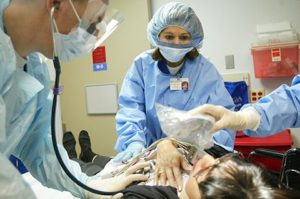Emergency Nurse: Education and Career Information
If you enjoy working in a medical setting and have an interest in trauma environments, you may want to consider a career as an emergency nurse. This position is highly specialized and requires complete focus and dedication. These nurses are trained to think quickly on their feet and solve traumatic situations. This role is very stressful, but lucrative and will be a rewarding career for the right candidate.
What does an emergency nurse do?
An emergency nurse does a number of tasks and is a highly specialized role. These nurses are skilled and trained to handle extreme medical situations. They work in trauma units with an entire medical team to administer care to patients who have been involved in traumatic situations, from children to adults. They have a high level of education and experience, and are considered one of the elite team members in their role. This is a very fast-paced career and has its share of challenges. They must be able to think quickly on their feet and assess conditions as they occur. They know how to operate very sensitive equipment, perform a variety of medical procedures, and are used to dealing with patients in critical care situations like fires, hurricanes, tornadoes and other life-threatening situations. They stabilize patients in trauma, work to minimize the pain, uncover the root of the problem and teach patients about injury prevention after the incident has been resolved. This is a very fast-paced and structured position. You will find these nurses in emergency rooms, trauma units and working for trauma-related agencies.
How much does a emergency nurse earn?
According to Payscale, an emergency nurse makes on average about $69,000 per year. This is based on education, location, facility, or whether or not they are working in private care. On the high scale, this can pay a lot more, especially if the emergency nurse works in the field.
What types of skills are needed to become an emergency nurse?
Communication Skills: An emergency nurse must have excellent communication skills as they will not only communicate with other healthcare professionals, but must be able to communicate with the patient, family members and other members of the team to resolve highly sensitive situations. They must be able to comprehend well and gather information and resources in a timely manner.
Decision-Making Skills: The emergency nurse must be able to make sound decisions and use good judgment. This is essential in being able to perform efficiently and productively. They must be able to handle stress well, and handle issues as they arise. The nurse must be able to think quickly and react in preparation for emergencies of any kind.
Technology Skills: Technology skills are a must, as the medical field relies heavily on the use of technology to keep track of patient records, administer medications, keep reports and changes, and other vital information. The emergency nurse must be able to use the equipment in the facility and out in the field in order to be effective. They must also be able to keep accurate records.
Supervisory Skills: An emergency nurse monitors the patient and their condition, but must also have good supervisory skills and be able to lead the nursing team when necessary.
Clinical Skills: An emergency nurse must have excellent clinical skills, and be able to perform medical procedures when needed. They must be well trained and be able to quickly and accurately assess a situation.
Internship Requirements
There are a number of internship requirements needed to be successful in this field, in addition to specialized training specific to this role.
Education Requirements
Emergency nurses go through the standard Bachelor’s of Science in Nursing (BSN) program to attain their degree. This is a four-year program that includes coursework like anatomy, physiology, biology, and chemistry. Once the student completes their program, they will be required to sit for the NCLEX-RN exam to become licensed. This is the National Council Licensure Examination for Registered Nurses, and is a 5-hour, computerized that adjusting the difficulty and subject matter based on how the student answers the questions.
Once they become licensed, they must begin their career path. This is a highly specialized position, so a nurse who wishes to work in this field will need to have at least five years of experience that specializes in critical/intensive care. During the post-licensure process, emergency nurses must get additional training as an emergency medical nurse or work in an intensive care unit. They should also have extensive training in all specialized areas that are specific to the intensive care field.
Emergency nurses should hold a number of certifications in order to be successful. They work in burn units and other critical care units, so they should have certifications that include advanced cardiac life support, CPR certification, advanced trauma care for nurses, neonatal resuscitation, advanced burn life support and a host of others.
Most emergency care nurses have gone on to get their master’s degree, which will open additional doors of opportunity. This is important in moving up the career ladder and increasing their level of pay. There are a number of exams to sit for in order to obtain these certifications, and will require additional education beyond the standard nursing program on a continuing education basis. Experience is also a big component of this role, and working in specific trauma units is beneficial, even when completing the internship.
This is a rigorous and demanding role. There must be a high level of compassion for patients and their families. This position is very stressful and demanding, and requires a high degree of dedication to be successful. Although lucrative, the working hours are varied and sometimes long, especially in a crisis situation. If you have decided to go this route, you will be part of an interesting team dedicated to helping people for the greater good who want to make a valued difference in the lives of others.






